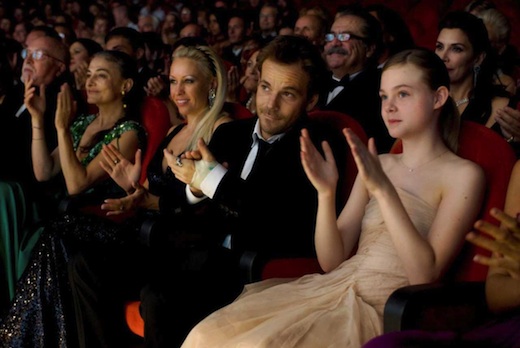Sofia Coppola is the product of a bona fide Hollywood dynasty. As the daughter of legendary director Francis Ford Coppola (Tetro), granddaughter of composer Carmine Coppola (Apocalypse Now), sister of Roman Coppola (best known as a music video director), a niece of Talia Shire and cousins with Nicolas Cage and Jason Schwartzman (Scott Pilgrim Vs. The World), it is fair to say that Sofia’s life is a little bit different to most folk.
Her debut film The Virgin Suicides was characterised by a lyrical melancholy that perhaps comes from being raised in this partially artificial environment, and she has been observing the pains of the upper class ever since through spot-on Lost in Translation and the impressionistic but flawed Marie Antoinette. The prospect of Coppola appealing to us about the burdens of the rich, as a surface examination of Somewhere might suggest, is not a terribly appealing one. Indeed, it is safe to say that Coppola has a very different view on the world of Hollywood to the rest of us. Yet perhaps because of a life surrounded by film, Coppola knows the power of observation and the gaze all too well. Supermarket tabloids have proved that as much as we want to turn away from the celebrities and their so-called problems, the possibility of a secret window into their lives is irresistible.
Johnny Marco (Stephen Dorff) is a movie star staying at the prestigious Chateau Marmont in Hollywood, his life a series of one-night stands and strippers. With the arrival of his eleven year-old daughter Cleo (Elle Fanning, The Curious Case of Benjamin Button), Johnny is given a different perspective on the way his life has turned out through the introduction of what is possibly his only human credential in the world. Devoid of all but one friend, Johnny has clearly left a string of annoyed ladies across the world, as a series of random encounters and anonymous angry text messages attests. When Johnny and Cleo part ways, albeit temporarily, Johnny wonders if he can go back to living the life to which he has become accustomed.
In the hands of anybody other than Coppola, this probably would have wound up being a wacky comedy with a series of misunderstandings leading to a saccharine resolution. However, in her pursuit of observational truth, Coppola is not seeking to illicit any emotion out of a scene. More accurately, Coppola does not attempt to illicit any one emotion from a scene, again recognising the power and nuance that can be found in the truth of the observation – and observe Coppola does. Every scene, every lingering moment, almost feels as though it has overstayed its welcome by a minute or so, but as we are taken to the next moment in Johnny and Cleo’s life (much as the jet-setting life of a Hollywood actor is) the jolt is palpable. Although only brief in its running time, Somewhere feels incredibly measured and carefully constructed. In a complete contradiction, it also feels loose and unstructured at other times, as though we are on the verge of something happening, but it is almost impossible to put one’s finger on. Perhaps it is because that like the characters Johnny plays on-screen, he is not actually being a father, but playing the part. Indeed, a broken arm and the presence of his daughter do little to chance his hedonistic behaviour.
Coppola’s films are often difficult to penetrate, perhaps because there is that level of distance between her experience and that of the audience. In many ways, this is why Lost in Translation was so successful: the lead characters were strangers in a strange land, and we were there along for the ride with them. Yet while one could jokingly observe that Somewhere is the latest in a series of Coppola’s films on Rich People Hanging Around Hotels, the more that life is considered, the less important it becomes to place these weighty meanings to the actions of those being observed. Coppola continues her impressionistic observation of the rich that was so blatant in Marie Antoinette, yet because these characters are so much closer to home than the French court, Somewhere comes across as less clever-clever than a pair of Converse in a wardrobe full of period costumes. Still, Coppola can’t help but show off her indie record collection, which seems to be permanently set to the early 2000s, with brother Roman’s favourite band The Strokes featuring prominently.
Buoyed by terrific performances – with Stephen Dorff potentially claiming the comeback kid of the year award and Elle “we hope there’s another” Fanning completely natural and refreshingly down-to-Earth – Somewhere is the type of film that needs to be washed over you several times before it is fully appreciated, but may also leave you feeling damp and uneasy on the first few passes. Although it may be too early in Coppola’s career to compare her with the greats of Yasujirō Ozu or Terrence Malick, the combination of Harris Savides’ (Greenberg) straightforward photography and Coppola’s gazing patience strikes a certain balance that Coppola is yet to fully make her own. Indeed, Coppola needs to be liberated from her own style at times. The ‘poor little rich boy’ motif can be frustrating, especially given that unlike the character of Marie Antoinette, Johnny Marco was probably not born into the life and is not the prisoner of society that Antoinette was. Yet even as he tries to walk away from it, one gets the impression he will also tire of fatherhood after a time and be inevitably be drawn back to the high life. In many ways, it is these same factors that invariably draw audiences back to the observation of the lives of rich people on a daily basis.
Somewhere opens nationally in Australia on 26 December 2010.






No Responses